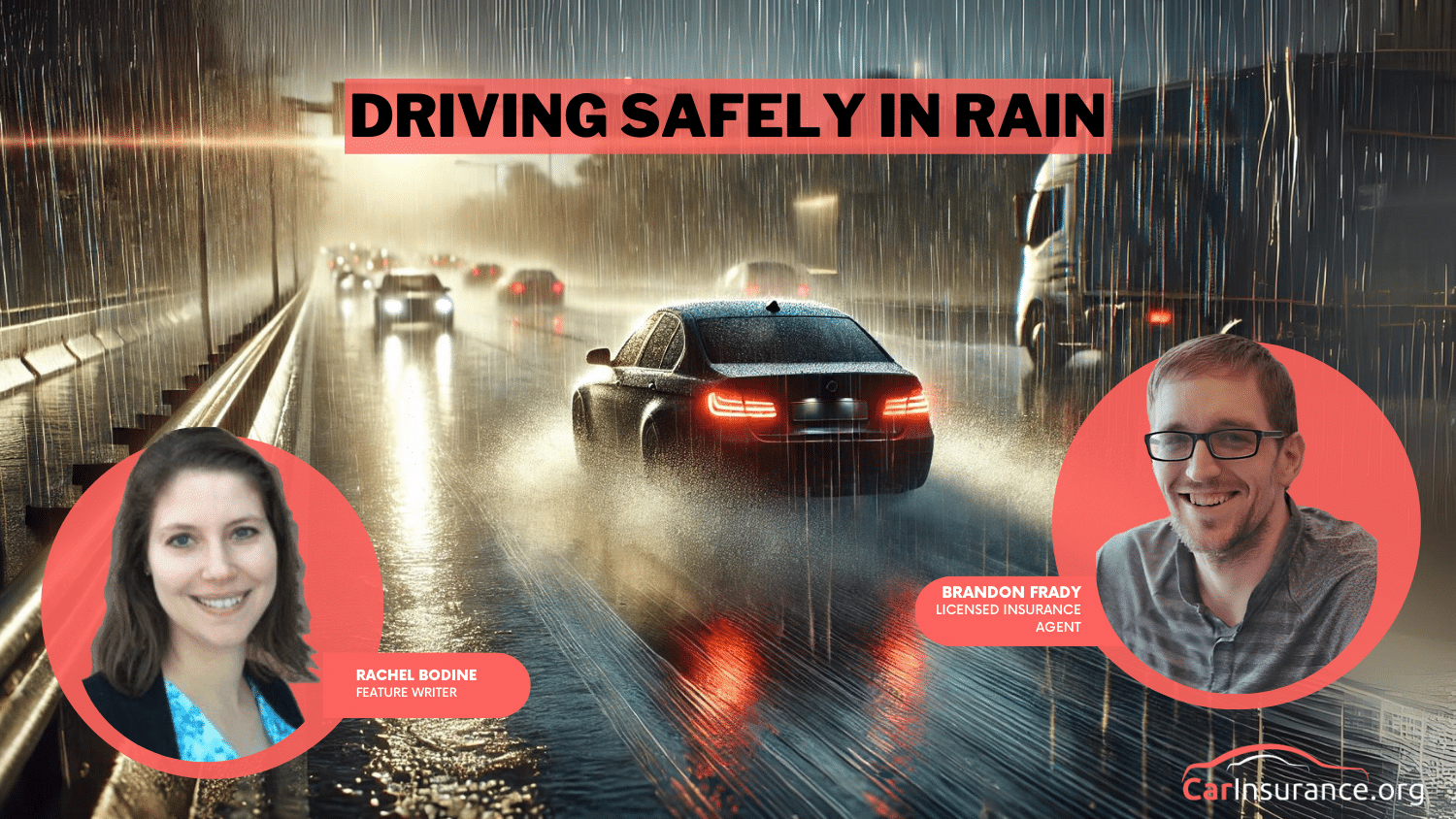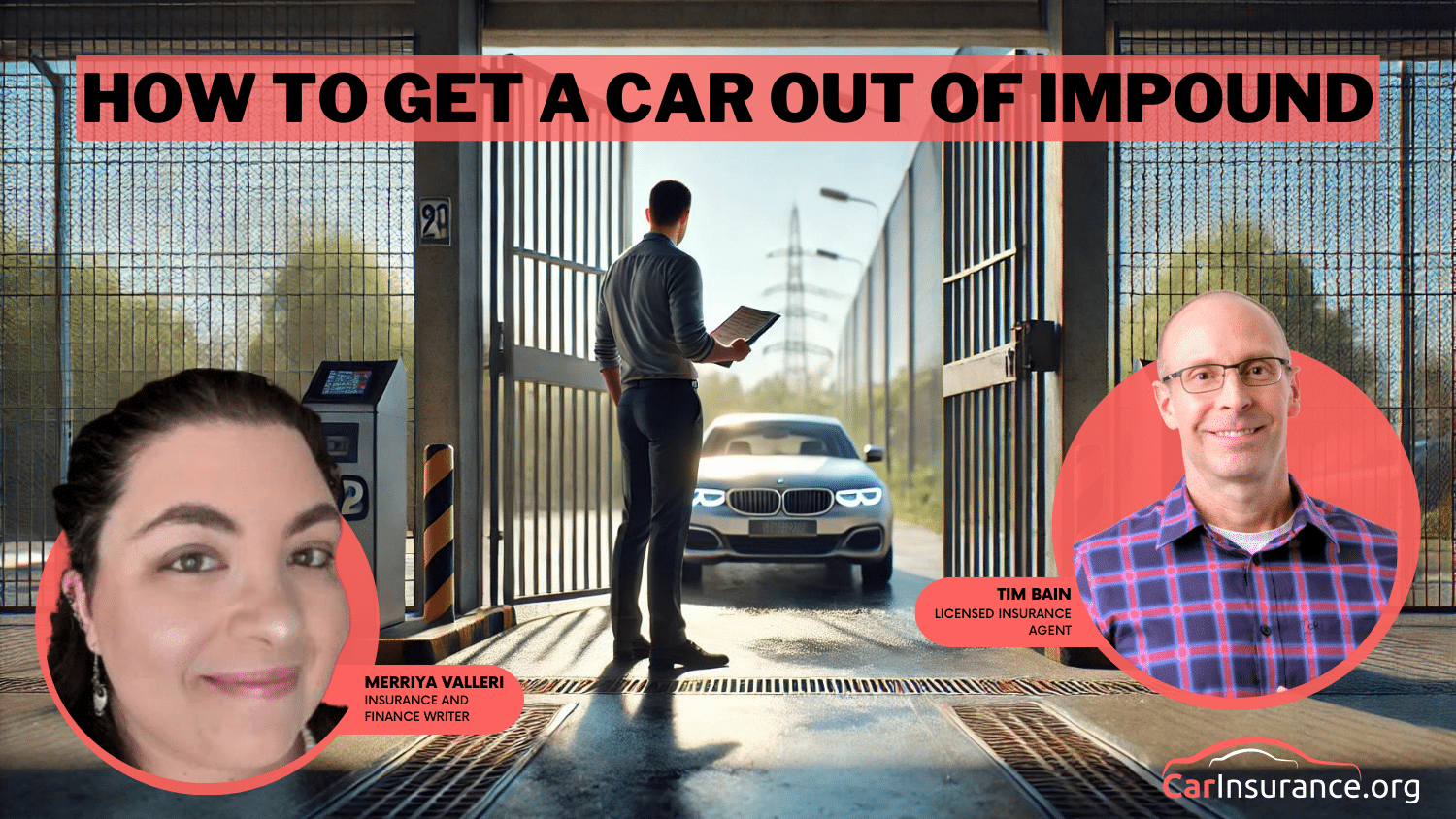Driving Safely in Rain and Wet Weather
Driving safely in rain and wet weather is incredibly important, as wet roads make it dangerous to drive. Drive carefully and watch your vehicle speed to prevent skids both when accelerating or braking, and you should give curves special attention by braking and steering lightly. To prevent hydroplane situations, keep your speed to a reasonable level in heavy rain, and never drive through puddles if you can safely avoid them. Scroll down for more tips on how to drive safely in the rain.
Read more Secured with SHA-256 Encryption




Table of Contents
Table of Contents


Insurance Feature Writer
Rachel Bodine graduated from college with a BA in English. She has since worked as a Feature Writer in the insurance industry and gained a deep knowledge of state and countrywide insurance laws and rates. Her research and writing focus on helping readers understand their insurance coverage and how to find savings. Her expert advice on insurance has been featured on sites like PhotoEnforced, All...
Rachel Bodine


Licensed Insurance Agent
Brandon Frady has been a licensed insurance agent and insurance office manager since 2018. He has experience in ventures from retail to finance, working positions from cashier to management, but it wasn’t until Brandon started working in the insurance industry that he truly felt at home in his career. In his day-to-day interactions, he aims to live out his business philosophy in how he treats hi...
Brandon Frady
Updated November 2024
Driving in the rain presents its own set of challenges. (image by cars-bulletin.com) Every time we get behind the wheel of our car, each of us is confronted with dealing with a number of different conditions that go well beyond our own cars and other drivers on the road. One condition is the weather, which can vary by season, by the day and in many cases, by the hour. While none of us can control the weather, we all can adapt our driving to match whatever conditions mother nature throws our way. Discover more tips on how to drive safely in the rain. (For more information, read our “How to Drive Safely, No Matter the Time of Day“).

Why should you slow down while driving in wet conditions?
If you live in an especially arid region, you’re probably not confronted with torrential downpours or even a little precipitation. But most of us don’t live in such areas, and thus, we’ll be forced to drive in rain and wet weather at times. Be it a spring shower, or a freak thunderstorm that dumps an inch or more of rain in the span of an hour, the vast majority of drivers will have to deal with rain and wet weather on occasion. Here are our tips on driving safely in rain or wet weather.
Rain and wet roads can lead to situations where a driver can lose control of their car. Braking distances are increased, your car may skid, and hydroplaning can occur. A good driver adapts to the conditions around them, and will never allow other factors on the road to surprise them. So adjust your speed accordingly and you may not have to worry about any of those things happening.
Free Insurance Comparison
Compare Quotes From Top Companies and Save
Secured with SHA-256 Encryption
What should you do if you start to skid on wet surfaces?
Driving carefully and slowly can prevent skids both when accelerating or braking. You should give curves special attention, braking, and steering lightly. Braking too hard can cause the wheels to lock and place you into a skid situation. Even if your car is equipped with antilock brakes (ABS), you may still skid, although you will do so in a straight line.
If you do begin to skid, do not panic. Take your foot off the accelerator and steer in the direction you want the car to go. You may have to turn the steering wheel repeatedly until you’re traveling in a straight line again. ABS-equipped cars are safe to brake without input from the steering wheel, while non-ABS automobiles can skid completely out of control if the brakes are applied too hard.
One very scary situation when driving on wet roads is having your car hydroplane. Hydroplaning occurs when water in front of your car is more than the weight of your car can push away. Worse road conditions make this more likely, but it can happen when there is just light rain. Your car is sliding on a thin layer of water, completely out of contact with the pavement during a hydroplane.
What should you do to prevent hydroplaning in bad weather on a road surface?
To prevent hydroplane situations on slick roads in rainy weather, keep your speed to a reasonable level, be sure to go at or even below the speed limit, and never drive through puddles, even if it is not deep water, if you can safely avoid them. One good tactic is to drive in the tire tracks of any drivers in front of you, as doing so will enable you to prevent your car from hydroplaning. But give the driver in front of you some space. Make sure to do so at a safe speed and from a safe distance.
If you do experience hydroplaning because of a slippery road, don’t suddenly break or turn. Doing so can make your car skid out of control. Ease off the gas, and your car should return to the road. If you have to brake, remember that ABS-equipped cars don’t require pumping the pedal. The ABS is much more capable of pumping the brakes than any driver.
What else should you know to avoid loss of control on a wet road surface?
Here are a few more tips to remember for driving in the rain:
- Good windshield wiper blades are a must. Always ensure you have a fresh set of blades capable of removing water. A good rule of thumb is to replace your wiper blades every six months, or when they no longer sweep away water off the glass effectively.
- We also recommend rain repellant application to your windshield. These products cause water to bead up and roll off your car’s glass. The most popular version is sold under the Rain-X brand.
- Make sure your tires are not worn. Check your tire tread often and find out what the minimum tread depth should be for your tires. Worn tires have less grip, and will be more prone to hydroplaning.
- Additionally, check your tire pressure. Make sure to check for proper inflation on your tires at least once every 30 days, or monthly, at minimum. Properly inflated tires are less prone to hydroplaning and will last longer. They’ll also ensure you’re maximizing your fuel economy.
- Never use your cruise control on wet roads, as it too can lead to hydroplaning. This recommendation should even be followed if your car has advanced active cruise control.
- Because rain and moisture can lead to fog, make sure you adapt your driving if you drive in a foggy area. Fog greatly reduces your visibility and calls for reducing your speed and following distances.
Before making any final decisions on your insurance company, it is important to learn as much as you can about your local insurance providers, and the coverages they offer. Call your local insurance agent to clear up any questions that you might have. Questions to consider asking include, “What is the best coverage plan for me/my family/my situation?” “What are the minimum coverage requirements in my state and what form of coverage do you recommend?” “Do you guys offer any bundle discounts if I take out both my auto insurance and home insurance with you?” and “What is the average rate of insurance quotes you guys offer?”
Before making any big insurance decisions, use our free tool to compare insurance quotes near you. It’s simple, just plug in your zip code and we’ll do the rest!

Get a FREE Quote in Minutes
Insurance rates change constantly — we help you stay ahead by making it easy to compare top options and save.

